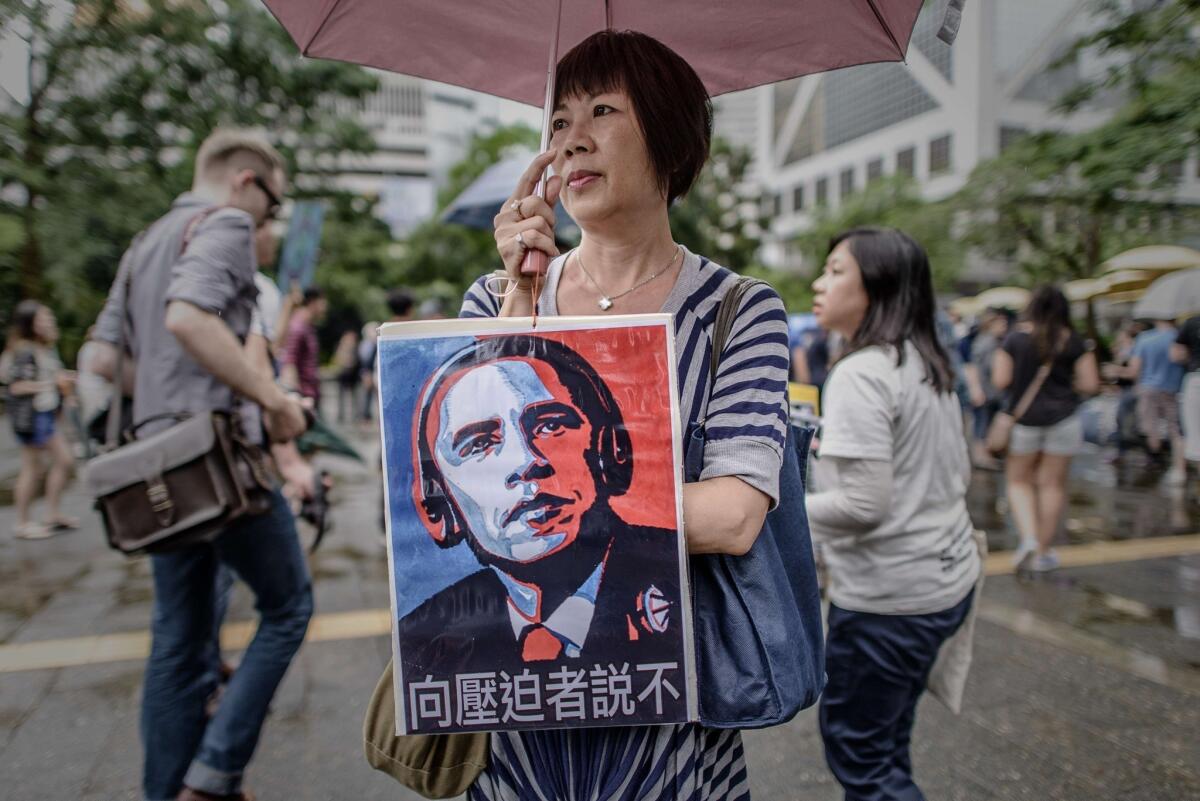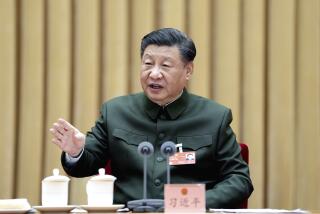China defends its handling of Edward Snowden case

- Share via
BEIJING -- Hitting back at Washington over the Edward Snowden case, China said Tuesday that Hong Kong had handled the matter lawfully, and it rejected U.S. suggestions that mainland officials had improperly intervened to allow him to flee to Moscow.
“The accusations against the Chinese government are groundless,” Foreign Ministry spokeswoman Hua Chunying said. “It is unreasonable for the U.S. to question the Hong Kong government’s handling of affairs in accordance with the law.”
Hua’s comments were part of a broad Chinese retort to White House complaints Monday that China had made a “deliberate choice” to let the wanted former National Security Agency contractor escape and that the move would negatively affect Sino-U.S. ties.
Snowden left Hong Kong on Sunday for Russia en route to a third country, with officials in the semi-autonomous city of 7 million saying that the U.S. had not supplied the proper documentation in requesting his arrest and that absent further details they were powerless to prevent him from departing.
With Snowden on the run, many media outlets in the mainland and Hong Kong have been heaping praise on the American for disclosing U.S. hacking of Internet and telecommunications facilities in China and beyond.
A strongly worded front-page commentary Tuesday in the People’s Daily, the main Communist Party newspaper, said Snowden had “torn off the sanctimonious mask” of Washington after years of the U.S. accusing China of cyber-espionage.
“Not only has the U.S. not explained or apologized, it expressed its resentment against Hong Kong. After the stealing was revealed, the robber not only felt no remorse, but also expressed resentment against the victim’s legal action, even framed the victim,” added the author, Wang Xinjun, a researcher with the Academy of Military Sciences of the People’s Liberation Army. “China cannot accept this resentment and opposition.”
On Monday, White House Press Secretary Jay Carney said the U.S. was “just not buying that this was a technical decision by a Hong Kong immigration official.”
“The Chinese have emphasized the importance of building mutual trust,” he said, “... and we think that they have dealt that effort a serious setback.”
Yet from the Chinese side, many here say it’s the U.S. that has damaged trust.
“Washington should come clean about its record,” the official Xinhua News Agency said in a commentary. “It owes too an explanation to China and and other countries it has allegedly spied on. It has to share with the world the range, extent and intent of its clandestine hacking programs.”
In referring to the U.S. stance, many commentators on the Snowden affair invoked the Chinese expression “zei han zhuo zei” -- meaning a thief who steals from someone, then shouts “stop thief!” to distract attention from his own misdeeds.
Snowden has largely been cast as a hero in China. “We wish Snowden good luck in this difficult time,” the Global Times, another paper closely affiliated with the Communist Party, said Monday. “His personal fate will reflect the game between U.S. hegemony and global pursuit for fairness and justice.”
Eric Sommer, a Beijing-based Canadian writing in the Global Times, even encouraged Beijing to reconsider offering Snowden a haven. “It is not too late for the Chinese government to consider offering asylum to whistle-blowers like him,” he wrote.
“Imagine that the situation was reversed, that a Chinese citizen fled to the U.S. with documentary proof of a vast worldwide Chinese cyber-surveillance and cyber-spying program ... which included hundreds of break-ins of sensitive U.S. computers and the theft of millions of text messages,” he added. “Would the U.S. government send that person back to China? It is virtually certain that individual would be granted refugee status.”
In Hong Kong, where Snowden’s case had threaten to deepen long-simmering divides over the degree of the former British colony’s autonomy from the mainland, his disclosures about U.S. hacking against Hong Kong had the unexpected effect of bringing together the city’s political factions in a brief alliance.
“Snowden’s arrival ... ushered in a near-unprecedented political solidarity as pan-democrats and Beijing loyalists lined up to take a shot at an unlikely target: the United States,” Stuart Lau noted in the South China Morning Post.
Officially, while Beijing has maintained an arm’s-length distance from the Hong Kong government’s move to allow Snowden to leave, various accounts of the events leading up to his departure indicate mainland officials were part of the decision-making behind the scenes.
Some Hong Kongers had hoped to see Snowden stay and fight extradition. But in wake of his departure, many have applauded what they called the city’s “gumption” in its handling of the case, which seems to have resulted in a boost of self-esteem for the city.
“There could be no better outcome for our city and China,” the Post wrote in an editorial.
“Whatever we think of Snowden or his tactics, he has served us well by sparking the much-needed debate on government access to personal data,” the paper added. “Our government did as it should and Beijing was wise to keep a distance. The best interests of the nation and Hong Kong have been served.”
ALSO:
Nelson Mandela remains in critical condition
Silvio Berlusconi found guilty of paying for sex with minor
Moscow ‘safest place’ for Edward Snowden? Global spy mystery deepens
Nicole Liu in the Times Beijing bureau contributed to this report.
More to Read
Sign up for Essential California
The most important California stories and recommendations in your inbox every morning.
You may occasionally receive promotional content from the Los Angeles Times.











